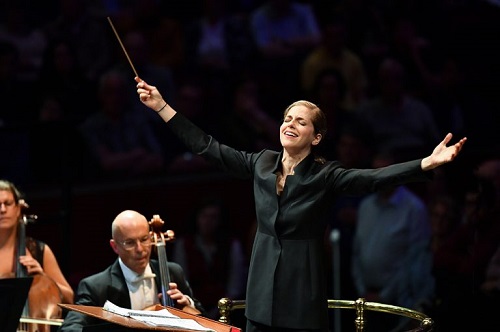 United States Di Castri, Beethoven, Lutosławski: Emanuel Ax (piano), Philadelphia Orchestra / Karina Canellakis (conductor). Verizon Hall, Kimmel Center, Philadelphia, 8.2.2020. (BJ)
United States Di Castri, Beethoven, Lutosławski: Emanuel Ax (piano), Philadelphia Orchestra / Karina Canellakis (conductor). Verizon Hall, Kimmel Center, Philadelphia, 8.2.2020. (BJ)

Zosha Di Castri – Lineage
Beethoven – Piano Concerto No.2 in B flat major Op.19
Lutosławski – Concerto for Orchestra
It sometimes happens that the way a soloist plays an encore reveals even more about his level of musicianship than his performance of the preceding concerto. I remember a Seattle Symphony concert some 13 years ago in which, as I commented at the time, the Schumann encore suddenly showed me just what had been most glaringly missing from the pianist’s concerto performance: any trace of an ability to get inside the music. If ever a piece demanded intimacy — demanded Schumann’s characteristic ‘Innigkeit’—that piece is Traümerei. Yet our soloist (whom I shall charitably leave unnamed) blazoned it grandiloquently forth for all the world like a public oration.
At the concerto now under review, Emanuel Ax’s choice of encore similarly fell on Schumann. But his playing of ‘Des Abends’ (‘In the Evening’) from the composer’s Opus 12 Fantasy Pieces precisely fulfilled the score’s instruction, ‘Sehr innig zu spielen.’ And, happily, the magic it breathed did indeed match the delicacy and filigree elegance that, without any lack of zest in the more assertive parts of the 2nd Piano Concerto, Ax had lavished on that work, which brought the Philadelphia Orchestra’s two-week conspectus of all five of Beethoven’s piano concertos to a sparkling close.
New York-born Karina Canellakis, a 38-year-old Curtis graduate who has just taken over as chief conductor of the Netherlands Radio Philharmonic, achieved a Philadelphia Orchestra debut of comparable artistry. Dispensing for this one work with a baton, she fashioned an orchestral performance that responded with unfailing sensitivity and crisp clarity to her eminent soloist’s range of expression.
The local premiere of Lineage, by Zosha Di Castri, had already provided vivid evidence of Canellakis’s graceful and lucid stick technique. Composed in 2013, and roughly ten minutes in duration, ‘The work’s title and musical inspiration sprang,’ Luke Howard’s program note told us, ‘from the composer’s reflection on the process of cultural transmission across generations and continents.’ Unlike many contemporary pieces that reflect similar aims, Lineage is at once unpretentiously and agreeably attractive in style, and it demonstrated a sure command of orchestral means and ends. It would be good to hear more of the 35-year-old Canadian composer‘s work.
The relatively early Concerto for Orchestra was the work that first firmly established Witold Lutosławski as one of the leading figures in the striking rebirth of Polish musical creativity in the second half of the 20th century. Unlike Bartók’s slightly earlier contribution to the genre, which for much of its length treats the orchestra’s instrumental families very much as independent groups, Lutosławski’s concerto concentrates more on the orchestra’s potential for often arresting blends of instrumental color and expression. Dramatic in gesture and incisive in manner, the long first movement is the most successful of the three.
Much as I admired the work when it first appeared in the 1950s, I feel now that the middle movement is less well-defined in character than the first, and that the finale can be described with some justice as one damn thing after another. No matter: it was good to hear the piece again, especially in as compelling a performance as Canellakis drew from the orchestra. She is surely one of the most impressive among the crop of female conductors that is currently and excitingly taking over the world.
Bernard Jacobson